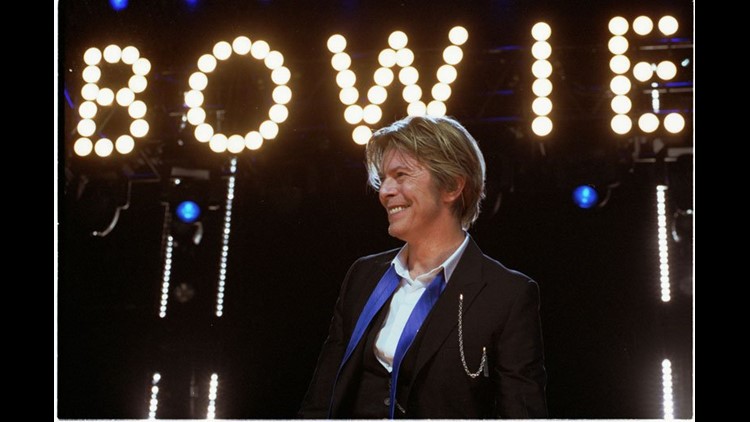David Bowie, whose incomparable sound and chameleon-like ability to reinvent himself made him a pop music fixture for more than four decades, has died. He was 69.
Bowie died Sunday after an 18-month battle with cancer, his publicist Steve Martin told CNN.
“David Bowie died peacefully today surrounded by his family after a courageous 18 month battle with cancer. While many of you will share in this loss, we ask that you respect the family’s privacy during their time of grief,” said a statement posted on his official social media accounts.
Neither his publicist nor the statement elaborated on what kind of cancer the singer was fighting.
David Bowie: Watch his greatest music and video moments
Bowie’s death has been the regular subject of internet hoaxes for the last several years. So the news came as a shock to fans and industry insiders when it was confirmed.
“Very sorry and sad to say it’s true. I’ll be offline for a while. Love to all,” his son, Duncan Jones, tweeted.
From a mop-topped unknown singer called David Jones, to his space alien alter ego “Ziggy Stardust,” to his dapper departure as the Thin White Duke, Bowie married music and fashion in a way few artists have been able to master.
He was theatrical, he was flamboyant, he was without parallel in his showmanship.
With a voice that soared from a baritone to a falsetto, he spoke of carrying on against the odds. Of the terror in knowing what the world is about. Of turning and facing the strange.
His songs were a salve for the alienated and the misfits of the world.
Bowie had just released his latest album, ‘Blackstar,’ on Friday, his 69th birthday. It shot to no. 1 on the iTunes chart in the U.K. and no. 2 in the U.S., underscoring his appeal even after decades in the music business.
Like his past releases, the work — generally praised by music critics — defied genres. The influential music publication NME called it an amalgamation of “warped showtunes, skronking industrial rock, soulful balladeering, airy folk-pop, even hip-hop.”
Indelible mark
That in a nutshell was Bowie: there wasn’t a musical style he didn’t dabble in – and indelibly leave his mark upon.
Since his breakthrough with 1972’s ‘The Rise and Fall of Ziggy Stardust and the Spiders from Mars,” Bowie’s reach was eclectic: glam rock, prog rock, pop rock, electronic rock.
And the results? Electric. To the tune of more than 130 million records sold.
Though he didn’t have his first No. 1 single in the United States until “Fame” in 1975, he’d already been making a mark with heavily played singles, including “Space Oddity,” “Changes,” “Suffragette City,” “Rebel Rebel” and his first Top 40 hit, 1975’s “Young Americans.”
After that, he was almost as present on the singles charts as the album charts, with hits such as “Golden Years,” “Under Pressure” (with Queen), “Let’s Dance” (another No. 1), “Blue Jean” and “Never Let Me Down.”
“David Bowie was one of my most important inspirations, so fearless, so creative, he gave us magic for a lifetime,” tweeted rapper Kanye West, as news of his death made the rounds.
Changing looks
Born David Jones to a waitress and a nightclub owner in South London, Bowie began his musical life with his birthname, riding the mod wave of the mid-1960s. He changed to Bowie to avoid confusion with Davy Jones, the lead singer of the Monkees, which was enjoying serious pop success at the time.
He always had impeccable timing.
He released his song about a doomed astronaut, “Space Oddity,” just days before the 1969 Moon landing.
Four years later he killed off his most famous creation, the other-worldly “Ziggy Stardust,” just at the point it threatened to overwhelm him.
He then transformed into the Thin White Duke, a cocksure but coked-out mad aristrocrat. While Ziggy was all arena rock, The Duke was chilled soul. While Ziggy gave him “Space Oddity,” the Duke gave him yet another timeless classic, “Fame.”
With Bowie, it was difficult to separate art from reality. And as the drug-taking took its toll, he holed up in Berlin and recorded the ground-breaking Berlin trilogy.
“David Bowie was a true innovator, a true creative. May he rest in peace,” tweeted uber-producer Pharrell Williams.
But just when one thought one could write off Bowie as a peddler in theatrics, he shed his flamboyance for a no-frills, earnest appearance for a 1977 Christmas TV special to sing “The Little Drummer Boy” with Bing Crosby.
The 80s and beyond
The 1980s were a great time to be Bowie.
Starting with his collaboration with Queen on “Under Pressure,” he brilliantly reinvented himself to take full advantage of the video music era.
“Let’s Dance” became his most commercially successful album, its sound and his look influencing a new generation of musicians – this time, the New Wave of pop.
Then it was time for another transformation – that of a movie star.
He played the lead in movies such as “Labyrinth” and “The Man Who Fell to Earth,” did a three-month stint on Broadway as the “Elephant Man,” and had cameos in TV shows such as “SpongeBob SquarePants.”
Through it all, his Midas touch made classics of other people’s songs. He produced Lou Reed’s “Transformer,” with its hit “Walk on the Wild Side,” and Iggy Pop’s “Lust for Life,” among others.
“David’s friendship was the light of my life. I never met such a brilliant person. He was the best there is,” Iggy Pop said.
Bowie’s output thinned in the 1990s and the 2000s, but they were no less envelope-pushing. He experimented with heavy metal, with industrial rock, and with drum and bass.
His androgynous look always led to questions of his sexuality that, like his music, defied classification.
He told Playboy magazine in the 1970s that he was bisexual. He told Rolling Stone in the 1980s he had always been a “closet heterosexual.”
In 1992, Bowie married his second wife, model Iman. They have a daughter together.
By the early 2000s, his health was failing too. He had an emergency angioplasty in 2004.
He re-emerged in 2013 to great fanfare with “The Next Day,” and on Friday, released “Blackstar.”
As the world mourns Bowie’s death, fan Dean Podsta put it best:
“If you’re ever sad, just remember the world is 4.543 billion years old and you somehow managed to exist at the same time as David Bowie.”



